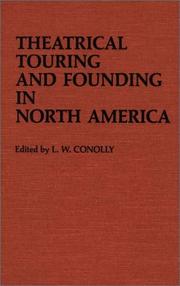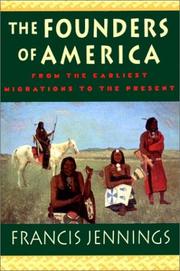| Listing 1 - 10 of 56 | << page >> |
Sort by
|

ISSN: 01633821 ISBN: 0313225958 9780313225956 Year: 1982 Volume: no. 5 Publisher: Westport, Conn.: Greenwood,
Abstract | Keywords | Export | Availability | Bookmark
 Loading...
Loading...Choose an application
- Reference Manager
- EndNote
- RefWorks (Direct export to RefWorks)
Book
ISBN: 0816015864 9780816015863 Year: 1987 Publisher: New York (N.Y.): Facts on file,
Abstract | Keywords | Export | Availability | Bookmark
 Loading...
Loading...Choose an application
- Reference Manager
- EndNote
- RefWorks (Direct export to RefWorks)
Cartography --- History --- History. --- North America --- Cartography - North America - History
Book
ISBN: 9782870039205 2870039204 Year: 2022 Publisher: Bruxelles Couleur livres
Abstract | Keywords | Export | Availability | Bookmark
 Loading...
Loading...Choose an application
- Reference Manager
- EndNote
- RefWorks (Direct export to RefWorks)
La philosophie communautarienne est un puissant courant de philosophie politique très présent aux Etats-Unis et au Canada. En réaction au succès et aux excès de la philosophie libérale, il valorise le rapport vivant à des traditions spécifiques et les pratiques solidaires vécues au sein d’attachements communautaires. L’auteur organise le débat entre ces deux courants philosophiques qui se complètent et se corrigent bien davantage qu’ils ne s’opposent. Philosophie communautarienne et philosophie libérale s’invitent aux débats, parfois houleux, qui traversent les différents courants de la classe politique démocratique, ainsi laïcité inclusive versus laïcité républicaine, préservation des identités culturelles versus cosmopolitisme des citoyens du monde, luttes pour la reconnaissance versus luttes pour la redistribution. Les thèses des quatre auteurs majeurs – MacIntyre, Walzer, Taylor et Sandel – sont abordées et illustrées par les œuvres de sociologues communautariens peu connus en Europe, ainsi de Barber, Etzioni et Putnam. Un dernier chapitre est consacré à la présence insistante de ces thématiques dans les discours de Barak Obama.
Solidarity - Political aspects - Philosophy --- Welfare state - North America - History --- Welfare state - Philosophy --- Communitarianism - North America - History --- Communitarianism - Philosophy --- Social policy - Philosophy --- Social structure - Philosophy --- Political science - Philosophy
Digital
Abstract | Keywords | Export | Availability | Bookmark
 Loading...
Loading...Choose an application
- Reference Manager
- EndNote
- RefWorks (Direct export to RefWorks)
Digital
Year: 1829 Publisher: London Longman, Rees, Orme, Brown, & Green
Abstract | Keywords | Export | Availability | Bookmark
 Loading...
Loading...Choose an application
- Reference Manager
- EndNote
- RefWorks (Direct export to RefWorks)
Indians -- Origin --- Northwest Passage --- North America -- History --- America -- Discovery and exploration
Book
ISBN: 1609177517 Year: 2024 Publisher: East Lansing, Michigan : Michigan State University Press,
Abstract | Keywords | Export | Availability | Bookmark
 Loading...
Loading...Choose an application
- Reference Manager
- EndNote
- RefWorks (Direct export to RefWorks)
"Richard Gebhart traces the Atlantic-bound voyages of Great Lakes ships, recovering the voices of long-ago ship captains, along with their cargo manifests and itineraries. Drawing on research in old newspapers and maritime archives, he traces the construction of new ships and shipyards, the comings and goings and travails of the lakes' workhorses, and makes a visit to a boneyard where many ships ended their lives. Among many other lost tales, Gebhart brings back to light the rise of oil tankers, marking the great twentieth-century energy transition in shipping"--
Sailing ships--Great Lakes (North America)--19th century--History. --- Steamboats--Great Lakes (North America)--History--20th century. --- Steamboats--Great Lakes (North America)--History--19th century. --- Tankers--Great Lakes (North America)--History--20th century. --- Shipping--Great Lakes (North America)--History--20th century. --- Shipping--Great Lakes (North America)--History--19th century. --- Shipping--Atlantic Ocean--History--19th century. --- Shipping--Atlantic Ocean--History--20th century. --- Sailing ships --- Steamboats --- Tankers --- History. --- History
Book
ISBN: 1283278553 9786613278555 0520950445 9780520950443 9781283278553 9780520244283 0520244281 9780520270992 0520270991 Year: 2011 Publisher: Berkeley, CA : University of California Press,
Abstract | Keywords | Export | Availability | Bookmark
 Loading...
Loading...Choose an application
- Reference Manager
- EndNote
- RefWorks (Direct export to RefWorks)
Spirits of Protestantism reveals how liberal Protestants went from being early-twentieth-century medical missionaries seeking to convert others through science and scripture, to becoming vocal critics of missionary arrogance who experimented with non-western healing modes such as Yoga and Reiki. Drawing on archival and ethnographic sources, Pamela E. Klassen shows how and why the very notion of healing within North America has been infused with a Protestant "supernatural liberalism." In the course of coming to their changing vision of healing, liberal Protestants became pioneers three times over: in the struggle against the cultural and medical pathologizing of homosexuality; in the critique of Christian missionary triumphalism; and in the diffusion of an ever-more ubiquitous anthropology of "body, mind, and spirit." At a time when the political and anthropological significance of Christianity is being hotly debated, Spirits of Protestantism forcefully argues for a reconsideration of the historical legacies and cultural effects of liberal Protestantism, even for the anthropology of religion itself.
Healing - Religious aspects - Protestant churches. --- Healing -- Religious aspects -- Protestant churches. --- Liberalism (Religion) - North America - History. --- Liberalism (Religion) -- North America -- History. --- Protestant churches - North America - History. --- Protestant churches -- North America -- History. --- Protestantism - North America - History. --- Protestantism -- North America -- History. --- Healing --- Protestantism --- Protestant churches --- Liberalism (Religion) --- Complementary Therapies --- Christianity --- Therapeutics --- Religion --- Humanities --- Faith Healing --- Spiritual Therapies --- Religious aspects --- History --- 20th century anthropology. --- 20th century christianity. --- 20th century protestants. --- anthropology and christianity. --- canada and religion. --- christian history. --- christian missionary. --- christian salvation theory. --- christian students. --- christianity and protestants. --- ethnography and religion. --- liberal christianity. --- liberal protestantism. --- liberal protestants. --- medical missionaries. --- medicine and christianity. --- medicine and religion. --- religious history. --- religious studies students. --- science and religion. --- secularism and religion. --- History.
Book
Year: 2013 Publisher: Leiden : BRILL,
Abstract | Keywords | Export | Availability | Bookmark
 Loading...
Loading...Choose an application
- Reference Manager
- EndNote
- RefWorks (Direct export to RefWorks)
In North America's Indian Trade in European Commerce and Imagination, Colpitts analyzes the imaginative and intellectual response of Europeans to their expanding trade relations with America's people in the period of colonization.

ISBN: 0815603827 Year: 1994 Publisher: Syracuse, N.Y. Syracuse University Press
Abstract | Keywords | Export | Availability | Bookmark
 Loading...
Loading...Choose an application
- Reference Manager
- EndNote
- RefWorks (Direct export to RefWorks)

ISBN: 0393033732 0393312321 Year: 1993 Publisher: New York ; London Norton
Abstract | Keywords | Export | Availability | Bookmark
 Loading...
Loading...Choose an application
- Reference Manager
- EndNote
- RefWorks (Direct export to RefWorks)
Indians of North America --- Indiens d'Amérique --- History. --- Histoire --- Indiens d'Amérique --- History --- Indians of North America - History.
| Listing 1 - 10 of 56 | << page >> |
Sort by
|

 Search
Search Feedback
Feedback About UniCat
About UniCat  Help
Help News
News